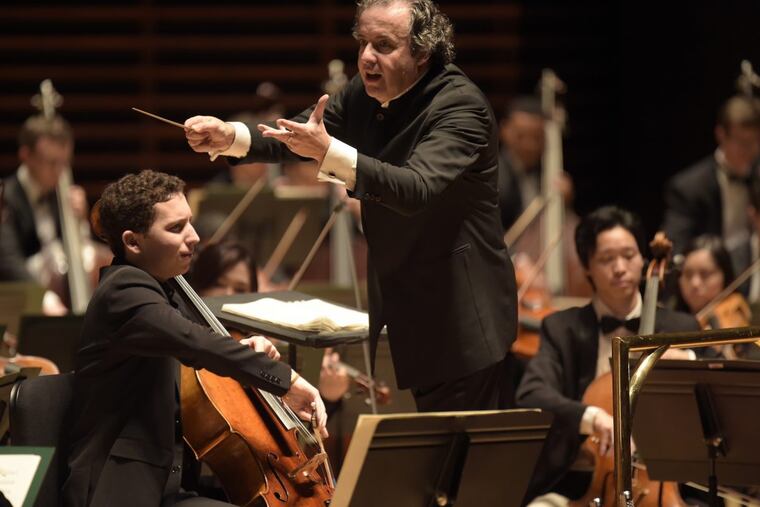A fast ride for the Curtis Orchestra with conductor Juanjo Mena
In the season opener, the BBC Philharmonic's chief conductor led the Curtis students in a concert of tall tales and vivid imagery.

A quick spin in a sports car.
Charging giants who turn out to be nothing more than windmills.
The sound when the guillotine falls and a severed head goes bouncing — thump, thump, thump.
Strong imagery flew by in three works Sunday afternoon at the season-opening concert of the Curtis Institute of Music orchestra in Verizon Hall. The pieces were about as programmatic as you can get. Even if John Adams didn't specify an exact journey in his Short Ride in a Fast Machine, essentially a five-minute overture, he has explained the title by asking what it feels like to accept an invitation to ride in a sports car and then live to regret it.
No regrets in the Adams piece Sunday. Conducting fellow Carlos Ágreda took turns at full throttle, and the ensemble lived to tell a tale of optimism and wonder in bracing rhythms. The rest of the program was led by Juanjo Mena, chief conductor of the BBC Philharmonic, a conductor who favors cranking up the speed of the orchestral machine generally. The ensemble responded, but nuance and detail sometimes got left out in the heat of the moment.
Mena's faster-than-usual tempo in the opening of Berlioz's Symphonie fantastique was a novelty with a breathtaking payoff. Those first few bars seemed to drift on an ill wind, and I'm sure not many of us in the audience had previously considered this expressive possibility. But elsewhere, the constant feeling of pressing forward and the way he avoided even subtle slowings at the ends of phrases came across as a bit callous.
The season is young, and so is this orchestra, but while there was a lot to admire — an English hornist, Kip Zimmerman, of ringing presence, and a double-bass section tree-trunk thick in sound — you might have hoped for more emphasis on the bloom of overall orchestral sound. There are those times in this piece where Berlioz's special orchestrations perform alchemy in midair, and the Curtis orchestra's sound wasn't made of ingredients quite potent enough. Many of these players will someday know the red-hot blaze of the last chord. Nothing else like it exists.
Two students in the Strauss, however, sounded like no students at all. Cellist Oliver Herbert, 20, has already played Don Quixote with the Chicago Symphony Orchestra. Violist Hae Sue Lee, 17, was his Sancho Panza, and both built character with admirable refinement. In the title role, of course, Herbert has more opportunity, and he indeed plays with all the depth of an established soloist. In the disturbing "The Knight's Vigil" variation, Herbert's playing took on deeply moving vocal inflections in extreme ranges, from a low of unusual richness to a delicate high.
Don Quixote is, like a lot of Strauss, a vast canvas, and if this year's iteration of the Curtis orchestra hasn't yet found the most personal moments of music-making, its best trait was in full supply. At times, the energy just rolled off the stage.